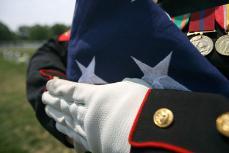By Zachary Porcu

Gunnery Sgt. Mark Oliva / Marine Corps Base Camp Pendleton
By Zachary Porcu
The United States is home to some 300 million or so citizens, and because of this, one can hardly expect all of them to be present in a meeting of Congress.
Fortunately, this is hardly an issue, thanks to the convenience of our representative democracy.
But, while some Americans may be perfectly happy allowing our elected officials to run everything with no questions asked, a majority of us prefer to keep in touch with what goes on.
This is why more than a few eyebrows were raised back in 1991 when President George H. W. Bush set a ban on the photography and filming of flag-draped caskets coming back from war zones.
One can almost sense the Orwellian-styled thought that went into such a decision.
Images coming back from the Vietnam War played a huge part in emotionalizing the war, and one can understand how a constant visual reminder of American casualties contributed to it’s unpopularity.
Little wonder, then, that such a tool would not be put in the hands of the media for future wars.
Of course, the photo ban hardly qualifies as a scandal, so the significance may easily be overlooked, but the purpose is served: it is far different to read off merely statistical casualties than it is to watch solemn faces transporting the caskets of fallen warriors.
Fortunately, Defense Secretary Robert Gates recently lifted the ban on such imagery in the spirit of “unprecedented transparency” which is supposed to pervade the Obama administration.
“After receiving input from a number of sources,” Gates said at the Pentagon news conference on February 26, “including all the military services, and organizations representing military families, I have decided that the decision regarding media coverage of the dignified transfer process at Dover should be made by those most directly affected: on an individual basis by the families of the fallen.”
But now the policy has taken an interesting twist, putting the power of the media in the hands of the families.
It would seem that the right thing is being done, only now it seems to be for all the wrong reasons. What was once an issue of information is now surprisingly one of “taste.”
“I have always believed that the decision as to how to honor our fallen heroes should be left up to the families,” Vice President Joe Biden said. “The past practice didn’t account for a family’s wishes, and I believed that was wrong.”
The vice president seems to be implying that the whole problem with the previous policy was its lack of attention on families, never mind any ulterior motives that might be at work by policymakers.
Are we going to ask the families of every officer about every decision we make regarding our troops?
John Ellsworth, president of Military Families United, clearly underlined what he felt was the central point, “It shouldn’t be up to the government to hide these images to the public,” he said. “But at the same time, I don’t know that we can allow the press to overstep the bounds of good taste in some of these instances.”
“Bounds of good taste?” One wonders if Ellsworth is merely grasping for filler words, but to use such a phrase in this regard seems degrading to the entire subject matter.
“Some people,” Ellsworth continued, “want to celebrate the lives of their fallen, and share their fallen hero with the American people, while others want to hold them a little closer to the vest and keep it private. We should respect that.”
Again, non-descript filler-phrases like “closer to the vest” and “keep it private.”
I’m sorry, but when did the American people lose their renowned boldness?
When did the issue of these brave young men take on vocabulary reminiscent of describing someone’s dubious personal life? When did a family gain the right to veto the honor of dying in battle?
Ralph Begleiter, a professor at the University of Delaware, in a January interview with Huffington post, argues that the fallen troops “died for all of us, they died for the nation, they died for the cause. It’s a right for all Americans to pay their respects for those who made the sacrifice. It is not a right held exclusively for the families themselves.”
Furthermore, Jon Soltz, a former captain and veteran of both the Kosovo campaign and the Iraq war, raises an important point: “Despite what other people in other groups like to say, when men and women raise their right hand for the armed forces of the United Statees, they don’t do it to a political party. And they don’t do it for a president. They do it for the Constitution.”
Such a point is well worth bearing in mind, considering that freedom of press is a constitutional right. And if the government itself cannot prohibit constitutional rights, why should families be able to?
This sort of emotional reaction on the part of the families starts to look even more absurd when one realizes that the “invasion of privacy” described is really nothing short of imagination.
Begleiter notes that “none of these caskets are identified in any way so there’s no invasion of privacy in the first place.”
Of course, that this issue is even being brought up in these terms remains a disturbing point.
There are certainly families out there who oppose the war, but there’s a huge difference between supporting a war and supporting the troops.
Waking up on the battlefield every day to the fact that you might not see tomorrow is nothing to scoff at, and the bravery required for such a duty certainly doesn’t need to be kept “closer to the vest.”
No one has the right to take away the recognition for such caliber of character.
And if a soldier pays the ultimate price for his country, should not that sacrifice, at the very least, be honored? Regardless of the war or the policy or the politicians, the soldier put his fellow countrymen above himself and is no longer with us because of it.
This, and not a hyper-sensitive photo policy, pays true honor to the families, not just of the fallen, but to every family in the country.
By all means let’s see them returning home, their caskets embraced by the flag as their memories are embraced by our hearts.






